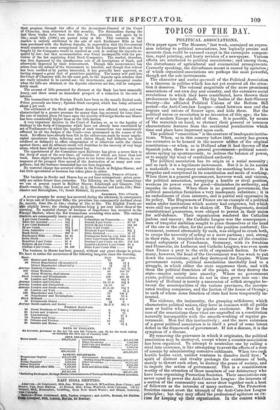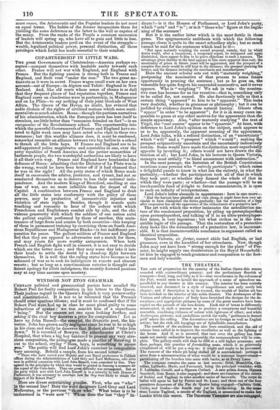TOPICS OF THE DAY.
POLITICAL ASSOCIATIONS.
OUR paper upon " The Measure," last week, contained an expres- sion relating to political associations, less logically precise and accurate than could be excused except in the extempore composi- tion, rapid printing, and hasty revision of a newspaper. Various effects are attributed to political associations ; and among them, the disturbance of agricultural and commercial arrangements. Correctly speaking, the disturbance meant is caused by agitation ; of which organized associations are perhaps the most powerful, though not the sole instruments.
The character and modus operandi of the Political Association is a theorem in politics which has not yet received all the atten- tion it deserves. The colossal magnitude of the more prominent associations of our own day and country, and the extensive social revolutions to which they have contributed, have thrown their predecessors into the shade. The big bodies of the Anti-Slavery Society—the affiliated Political !lions of the Reform Bill period—the Anti-Corn-law League—stand between men and the leagues and unions of former ages, and hide them. But the political union or association is no invention of this age the his- tory of modern Europe is full of them. It is possible, by means of the materials on hand, to abstract their general or common characteristic features from the accidental peculiarities which time and place have impressed upon each. The political " association " is the creature of inadequate institu- tions. 'When, as in this country before 1831, society has grown too extensive to be housed in the narrow edifice of the original constitution—or when, as in Holland after it had thrown off the Spanish yoke, there is no general government—political associ- ations spring up spontaneously, to redress the balance of power, or to supply the want of centralized authority.
The political association has its origin in a social necessity ; and as such it is a legitimate instrument. But it is in its nature a makeshift—a temporary substitute for something better. It is irregular and exceptional in its constitution and mode of working. When there is a general government, however weak and vicious, the political association, occupying a hostile or rival position, weakens its power even for good—diminishes its authority, and impedes its action. When there is no general government, the political association furnishes a very inadequate substitute : it is an embodiment of class interests, and is partial and oppressive in its policy. The Huguenots of France are an example of a political union under institutions which society- had outgrown, but which were still too powerful to be shaken off. The Huguenots, denied constitutional guarantees, were obliged to persist in their union for self-defence. Their organization rendered the Catholics jealous and uneasy; the Catholic League was the consequence : men of irregular ambition sought to place themselves at the head of the one or the other, for the power the position conferred ; Go- vernment, coerced alternately by each, was obliged to crush both, to escape the necessity of acting as a mere partisan ; and, strong in their ruin, it trampled down at the same time all the constitu- tional safeguards of Frenchmen. Germany, with its Swabian and Hanseatic, its Lutheran and Catholic Leagues, was even more than France a prey to the evils of organized faction. In Ger- many, however, the head of the Government was too weak to put down the associations ; and they destroyed the Empire. Where government exists, political associations inevitably lead to a struggle, in which either the state suppresses them, and with them the political franchises of the people, or they destroy the state—resolve society into anarchy. Where no government exists, political associations do not in time grow into one : the history of Holland is merely a succession of selfish struggles be- tween the municipalities of the various provinces, the incorpo- rated trading companies and the faction of the house of Orange ; to each of whom some function of state had been temporarily in- trusted.
The violence, the insincerity, the grasping selfishness, which characterize political unions, they have in common with all public men or bodies who work by popular excitement. But in the case of the associations these vices are engrafted on a constitution naturally incompatible with the smooth-working of regular go- vernment. Men feel this instinctively ; and the mere existence of a great political association is in itself a proof of some latent defect in the framework of government. If not a disease, it is the symptom of a disease.
By removing the grievance in which it originates, the political association may be destroyed, except where a counter-association has been organized. To attempt to neutralize one by calling a rival into existence, is like attempting to avert the effects of a dose of arsenic by administering corrosive sublimate. When two such hostile bodies exist, neither ventures to dissolve itself first : a spirit of distrust and rivalry prolongs the existence of both, merely to thwart each other, to destroy the peace of society, and to impede the action of government. This is a consideration worthy of the attention of those members of our Aristocracy who have been organizing Protection Societies. Their associations can never equal in power the Anti-Corn-law League: the interests of a section of the community can never draw together such a host
of followers as the interests of many sections. The Protection Societies cannot avert the triumph of the Anti-Corn-law League principles ; but they may afford the professional agitators an ex- cuse for keeping up their organization. In the contest which
must ensue, the Aristocratic and the Popular leaders do not meet on equal terms. The habits of the former incapacitate them for yielding the same deference as the latter to the will or caprice of the many. From the ranks of the People a constant succession of leaders will spring up, who have all to gain and little to lose. But the Aristocratic leaders peril on the event of the struggle-- wealth, legalized political power, personal distinction, all those privileges which habit has made essential to their comfort.



























 Previous page
Previous page